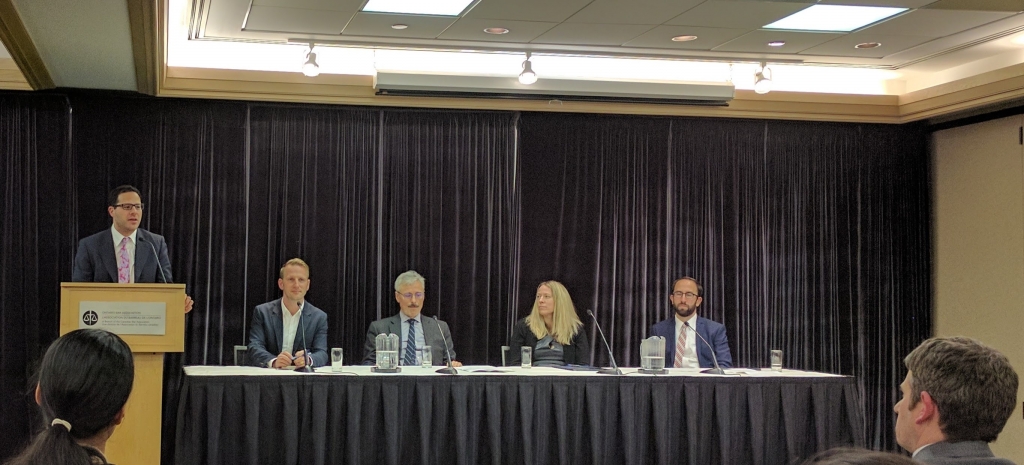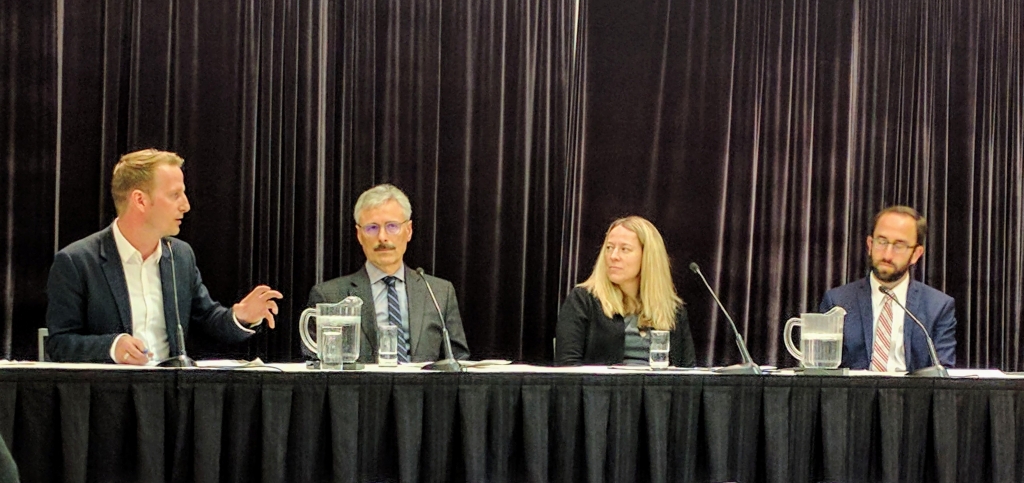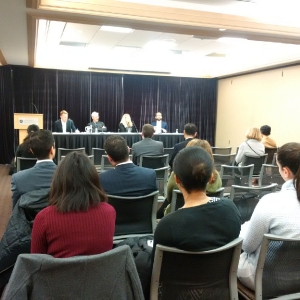Canadian Responses to the Syrian Refugee Crisis: Report from a CLAIHR Panel
By Jeremy Greenberg
Photos by Rikin Morzaria and Noah Aiken-Klar

Juda Strawcynzski, President of CLAIHR, speaks as Marco Oved, Mario Calla, Jacqueline Swaisland and Louis Century look on. Photo by Rikin Morzaria.
On November 24, Canadian Lawyers for International Human Rights co-hosted a panel discussion on “Canadian Responses to the Syrian Refugee Crisis,” in partnership with the OBA Foundation. Guests were treated to an in-depth and multifaceted overview of the ways Canadians have responded to the influx of Syrian refugees in the past twelve months.
The evening’s panelists included moderator Marco Oved of the Toronto Star, Mario Calla, Executive Director of COSTI Immigrant Services, Jacqueline Swaisland, coordinator of the Refugee Sponsorship Support Program (RSSP), and Louis Century, a former UN refugee assessor and current Associate at Goldblatt Partners.
Things kicked off with a look at what it’s like for the government-sponsored refugees who arrived this year, the largest cohort of which was welcomed by COSTI here in the GTA. Mr. Calla talked about the rewards and challenges of helping to bring in and integrate such a large and diverse group of families. He highlighted the incredible support his team received, not only from the government, civil society, and faith groups, but from the enthusiastic individuals and groups who nearly overwhelmed them with offers of support. He also underscored how hard COSTI and similar organisations had been working, long before the first group of families arrived. He finished by sharing some success stories such as Sarah’s, a Syrian refugee who just started Medical School at the University of Toronto in September.
Ms. Swaisland then spoke about the RSSP, which matches lawyers with groups seeking to sponsor Syrian refugees through the government’s private sponsorship program. The application process can be complex, and without the hundreds of legal experts partnering with the RSSP, it might not be navigable for the many dedicated people committed to sponsorship. Swaisland also talked about the uniqueness of the sponsorship program, which has garnered the attention of the UN High Commissioner for Refugees and others interested in implementing similar initiatives in their countries. She concluded by discussing the challenges of “getting it right”, and her optimism about helping to smooth out the process in the coming years.
Mr. Century, a practising civil litigator and former refugee assessor, described his recent experience watching the news out of Syria, wondering how he could help, and then finding out about the private sponsorship program. It was a short leap – but a lot of work – from there to starting up a sponsorship group at his law firm, which just welcomed a Syrian family less than a month ago. Echoing Ms. Swaisland, Century talked about the challenges and frustrations of the application process – even for an office full of lawyers – and also the incredible reward of finally welcoming the family.
Perhaps the most moving story, one shared by all the panelists, involved a raucous town hall meeting earlier this year. Back in March, the Deputy Minister for Immigration met with a group of would-be sponsors in Toronto to discuss the program. The frustrated and impatient crowd surprised the Minister with, as Century put it, “Their strong desire to help out. It was like NIMYBYism (Not In My BackYard) in reverse. A room full of people demanding ‘more refugees, in our backyards, now’. We knew Canadians were generous, but it was almost funny how ‘angry’ they were about not having more refugees, sooner. It’s a far cry from what you normally hear about ‘refugee complaints’.”
There were similar positive stories from all panelists: the Syrian who got his first ever job based on merit alone, and was so grateful he immediately signed up as a volunteer coordinator; another who could not understand why people he met in Toronto “never asked about his religion;” the many successful students; and other stories of resilience and early successes. But there have been challenges as well: the achingly slow process of refugee sponsorship. The harsh realities of life in a new country, halfway around the world. The difficulty of organising a large and enthusiastic team of volunteers.
Most pointedly, there was a lot of concern about what happens in the “13th month” for refugee families. Sponsorship groups have contracted to assume the finances of their sponsored refugees for the first 12 months. But the transition to month 13 can be difficult. Can families afford the apartment that had been formerly subsidised for them? Have they found good work? Are they financially secure? The panel noted that while month 13 can be challenging, sponsors can take proactive measures to prepare early on for this transition point.
Given the situation in Syria and other countries, too many refugees are still waiting for their chance at as Swaisland puts it, “the lottery of a lifetime” – being resettled in Canada. The good news is, based on the discussion and the enthusiasm of the event’s audience, there is definitely a desire by Canadians to continue to contribute as they can, a year after the first Syrian refugees arrived in Toronto.




